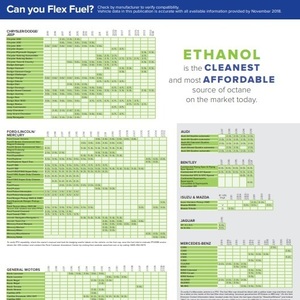RFA releases updated brochure tracking latest flex fuel models

SOURCE: Renewable Fuels Association
December 4, 2018
BY Renewable Fuels Association
More than 24 million vehicles on U.S. roads today are flex fuel vehicles (FFV), capable of running on fuel blends containing up to 85 percent ethanol (E85). Can your vehicle use a cleaner, higher octane flex fuel? The Renewable Fuels Association has updated its annual FFV brochure to help consumers find out. The brochure compiles the FFV models available in the current model year (MY2019), as well as previous years going back as far as MY1998.
According to the brochure, for MY2019, Ford/Lincoln/Mercury led the pack with 12 FFV models available, followed by General Motors with 11 FFV models available and FCA (Chrysler/Dodge/Jeep) with five models. Additionally, automakers Mercedes-Benz offers two, while Nissan and Toyota each offer one. All of the data used in the brochure was collected directly from the automakers.
Advertisement
Advertisement
“There are now approximately 4,500 retail stations throughout the country that offer E85 or other ethanol flex fuel blends, at least 500 more than last year and growing every week,” said RFA Vice President of Industry Relations Robert White. “This new brochure will help educate consumers about FFV availability, putting them in the driver’s seat when it comes to fuel choice. E85 is a cleaner, higher octane fuel and more consumers are gaining access to the fuel every year,” he added.
Consumers can locate E85 stations to fuel their FFVs at E85prices.com, and also view what pricing experiences other users have reported.
Advertisement
Advertisement
RFA offers hard copies of the brochure to fuel retailers and member companies at no cost. To view a copy of the brochure, click here.
Related Stories
The U.S. Department of Energy’s Office of Energy Efficiency and Renewable Energy is soliciting public comments on a preliminary plan for determining provisional emissions rates (PER) for the purposes of the 45Z clean fuel production credit.
On July 17, Iowa’s cost-share Renewable Fuels Infrastructure Program awarded $1.12 million in grants for 20 applicants to add B11 and 4 applicants to add E15 to retail sites. This was the first meeting following the start of RFIP’s fiscal year.
Par Pacific Holdings Inc., Mitsubishi Corp. and ENEOS Corp. on July 21 announced the signing of definitive agreements to establish Hawaii Renewables LLC, a joint venture to produce renewable fuels at Par Pacific’s refinery in Kapolei Hawaii.
A new study published by the ABFA finds that the U.S. EPA’s proposal to cut the RIN by 50% for fuels made from foreign feedstocks, as part of its 2026 and 2027 RVOs, could stall the growth of the biomass-based diesel (BBD) industry.
The European Commission on July 18 announced its investigation into biodiesel imports from China is now complete and did not confirm the existence of fraud. The commission will take action, however, to address some systemic weaknesses it identified.
Upcoming Events










